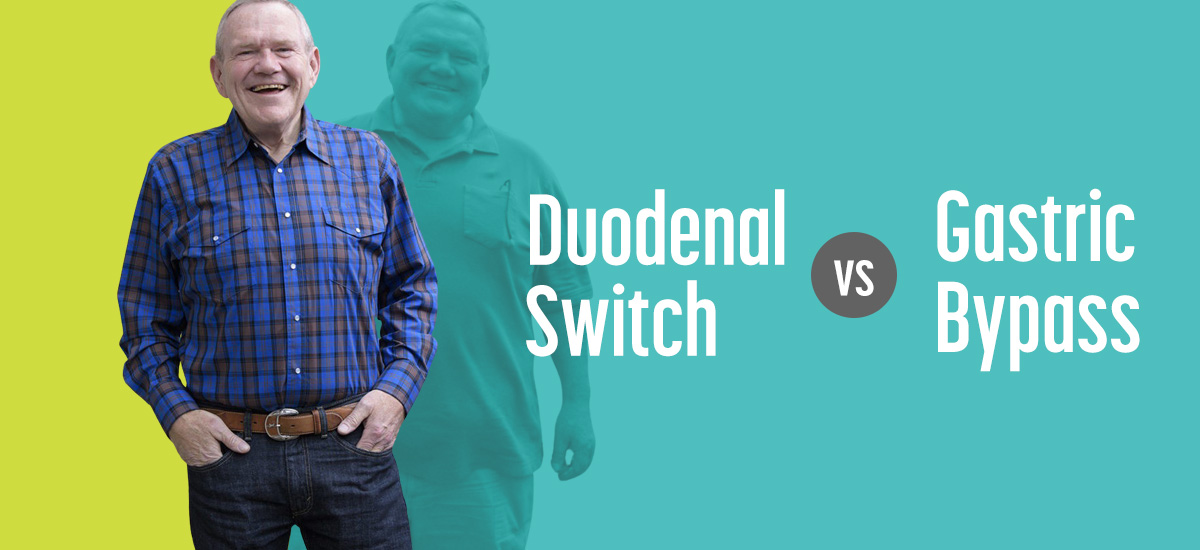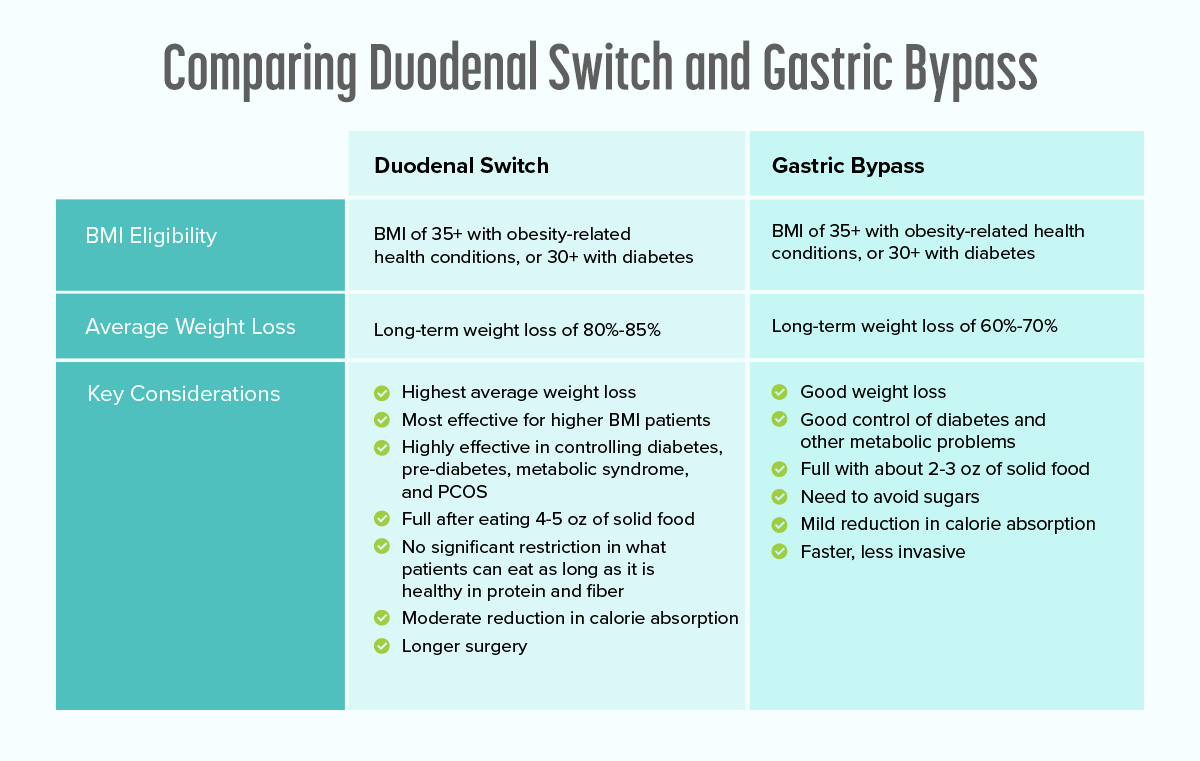
Duodenal Switch vs. Gastric Bypass

Obesity affects four in 10 Americans, according to the data collected by the Centers for Disease Control and Prevention. Even though overall health and weight are not always connected, obesity can increase the risk of developing comorbid and chronic health conditions like type 2 diabetes, heart disease and several types of cancer and PCOS.
Sometimes, following a balanced diet and exercising regularly are not sufficient to lose and keep weight off. Moreover, when health complications like high blood pressure, severe sleep apnea or type 2 diabetes occur, weight loss becomes an urgent priority.
Fortunately, there are a variety of innovative weight loss procedures and treatments that can help patients effectively lose weight. In this article, we’ll explore duodenal switch surgery vs. gastric bypass to help you make an informed decision when choosing weight loss surgery.
What Is Duodenal Switch Surgery?
The duodenal switch (DS) surgery is a combination surgery, with the first portion creating a vertical sleeve gastrectomy (VSG). During this phase, the upper and outer 90% of the stomach is removed, leaving a small, vertically oriented tubular stomach. The result is a banana or shirt “sleeve” appearance that is roughly 6 inches long and 1/2 inch in diameter.
The removal of the outer portion of the stomach almost completely removes the tissue that produces the hunger-stimulating hormone — ghrelin — so patients often report a significant decrease in hunger signals. However, DS surgery preserves important structural elements of the stomach, including the pylorus, antrum and nerves that control stomach function.
This option reduces stomach capacity from about 1 quart to roughly 4 ounces, but the stomach still functions like normal, allowing patients to enjoy a relatively normal diet. Depending on the sleeve size, patients report feeling full after eating around 4-5 ounces of food.
Duodenal switch surgery allows providers to add reduced calorie absorption to the VSG by rerouting the upper portion of the small intestine, combining two different mechanisms that complement each other to promote better weight loss and weight maintenance. By tailoring the amount of intestine bypassed and the length of the common channel (CC), these surgeries provide for adequate weight loss and maintenance while permitting enough small intestine length to absorb the necessary nutrients — delivering better long-term outcomes.
What Is Gastric Bypass Surgery?
Gastric bypass, or Roux-en-y Gastric Bypass (RNY GBP), is a weight loss surgery that involves dividing the stomach vertically to create a small, thumb-sized pouch. The upper fourth of the small intestine is bypassed by dividing it and attaching the lower section directly to the small stomach pouch.
Food travels through this portion of the small intestine, called the Roux limb. The upper section of the small intestine that carries bile and pancreatic juice is reconnected to the Roux limb about 3 to 5 feet below, where it connects to the pouch in a Y shape. This connection creates the last segment of the intestine where food and digestive juices mix together — this is called the common channel.
The RNY GBP primarily functions as a “restrictive” operation. The efficacy of this option depends on the sense of fullness induced by the small stomach pouch and the size of the opening between the pouch and the small intestine (stoma). Patients often report feeling full after eating 2 ounces of solid food, but some patients can lose their sense of restriction over time.
Malabsorption induced by this operation is determined by the length of the upper small intestine that is bypassed, but is usually mild. Calorie absorption is limited to the combined length of the Roux limb and the CC.
Key Considerations: Duodenal Switch vs. Gastric Bypass
Gastric bypass and duodenal switch surgery are both bariatric procedures that can help patients lose weight effectively. However, these surgical procedures use different methods to decrease stomach capacity and reroute the small intestine. They also offer patients different advantages and disadvantages.
Eligibility Requirements
The specific eligibility requirements for duodenal switch and gastric bypass include:
- Class III obesity that indicates a BMI greater than or equal to 40.
- A BMI greater than or equal to 35 with one or more obesity-related health conditions.
- A BMI greater than or equal to 30 and the development of obesity-related type 2 diabetes.
Prior to surgery, there is a physical as well as mental health assessment to ensure that the person is ready and able to commit to the changes necessary for these surgeries to be successful in the long term. Some insurance companies may require that patients complete a pre-surgery process, which may span a few months prior to surgery. This pre-surgery process helps ensure the patient understands everything they’d need to do in terms of diet, activity and lifestyle changes for insurance to agree to cover the operation.
In addition to meeting the criteria listed above, health care practitioners usually provide a weight loss plan before the surgery to ensure easier recovery and better outcomes.
Outcomes
Both gastric bypass and duodenal switch procedures achieve weight loss through restricted food intake and decreased calorie absorption. The surgery results ensure patients can avoid feelings of hunger as most patients tend to feel full after consuming 2 to 5 ounces of solid food, depending on which procedure they have.
Duodenal switch patients typically experience about 80-85% excess weight loss, or about 40% total body weight loss, which is around 15% better weight loss and management compared to gastric bypass surgery. All of these factors create a roughly 90% weight loss success rate and a 90% remission rate for those with elevated blood sugars and diabetes.
The proximal RNY GBP is associated with about 60-70% excess weight loss, approximately 29%-34% total body weight loss and has a good track record of controlling GERD.
When comparing duodenal switch vs. gastric bypass weight loss outcomes, it’s clear that duodenal switch surgery has better average weight loss. Duodenal switch surgery provides better control of diabetes, blood sugars, pre-diabetes and other conditions compared to gastric bypass surgery.
It is also very effective in controlling patients with significant metabolic problems related to obesity, such as elevated blood pressure and elevated cholesterol.
What to Know About the Risks
The risk of serious complications is low at about 2-4%. Patients can reduce these risks by adopting the recommended presurgical lifestyle changes and kicking harmful habits like smoking for at least one month before the surgery.

Why Trust Us for Your Weight Loss Surgery
The Center for Weight Loss Surgery is among the first recognized centers in the Pacific Northwest for exceptional bariatric surgery outcomes. We are committed to providing our patients with long-term care through comprehensive follow-ups. We understand that each of our patients has unique weight loss and health care needs, and we aim to ensure a successful journey toward a healthy weight for all patients.
Our trusted board-certified bariatric surgeon, Dr Myur Srikanth, has performed over 5,000 bariatric surgeries. Dr. Srikanth is also highly skilled in cosmetic and reconstructive surgeries. Our compassionate clinician, Karli Berry ARNP, assists in all surgeries and provides follow-up care for all of our bariatric patients.
We operate from clinics based in Federal Way, WA and Kirkland, WA, to offer patients convenient care throughout the Puget Sound area.
Schedule a Consultation at the Center for Weight Loss Surgery
If you are considering weight loss surgery to shed excess weight and improve your overall health, speak with your health care practitioner about the benefits of duodenal switch vs. Roux-en-Y gastric bypass surgery.
At the Center for Weight Loss Surgery, our experienced practitioners will help guide you through the process of choosing the most suitable weight loss surgery for your individual needs. We offer initial consultations and weight loss treatments that fit your health concerns and weight loss goals.
Schedule a consultation online or contact us directly at 877-815-2209 to learn more about our weight loss treatments.





